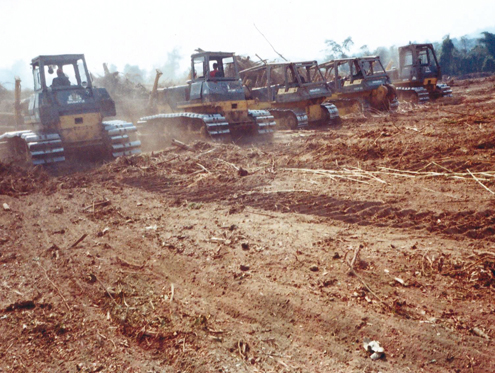Kachin farmers forcibly relocated to make way for plantations in the ecologically sensitive Hukawng valley (also Hugawng, Hukaung) are enduring great hardship at the poorly equipped relocation site where they have been forced to move to, according to Kachin human rights activists.
A recent report issued by the Kachin advocacy group Mungchying Rawt Jat (MRJ) accuses Burmese government officials and their well-connected business allies of condemning scores of farmers to grinding poverty after driving them off their land to make way for large-scale projects in Kachin state.
The forced relocation of an estimated 600 farming families began in 2006, some two years after the Hukawng tiger reserve was expanded to cover the entire valley’s 21,890 KM2, creating what has been heralded as the world’s largest tiger reserve.
According to Kachin activists, since the land grabs in the Hukawng valley began more than 200,000 acres of land has been seized from small-scale farmers to make way for massive plantations operated by the Yuzana company – one of Burma’s largest conglomerates.
It’s of little comfort to those displaced by Yuzana’s activities that the firm’s millionaire owner Htay Myint, an elected MP for the ruling USDP, continues to be the subject of US sanctions, a punishment he received for his ties to the previous military regime.
Yuzana bears the bulk of the responsibility for both the large-scale displacement in the Hukawng and the dramatic decline in the valley’s environment, according to MRJ spokesperson Ahn Htung.
“The relocated people are facing difficulty surviving,” she told DVB.
One such displaced person is Bawk Nan, a 35-year-old women now living in Hukawng’s Sanpya “model village”. She told MRJ researchers how her life and that of her family had deteriorated significantly since a joint group of government officials and Yuzana staff seized their land in early 2008.
“They forced us to sign that we would move according to the order from the government. After relocating, there is no land for farming,” she said.
Prior to the land seizure, Bawk Nan and her family were able to grow 300 to 400 baskets of rice per season but now are left with few options but to work for the same crony-controlled firm that seized their land.
“You will come and work for Yuzana when you start starving. Prepare to be slaves of Yuzana,” a Yuzana official told told Bawk Nan and her fellow villagers during a compulsory public meeting held shortly after the land seizures took place.
Life in the model village is difficult for Bawk Nan and her now landless family — the new village lacks proper water and the homes are far smaller than what they need and were poorly built, the villagers claim.
“We are unhappy, depressed and struggling to survive,” Bawk Nan told MRJ.
La Mung Tang Gun, another farmer interviewed by MRJ’s researchers tells an equally depressing story. Tang Gun and his family used to be able to harvest more than 2,000 baskets of rice from his land every year until February 2008 when Yuzana’s tractors arrived. Today Tang Gun and his relatives are relegated to work as poorly paid laborers.
“We cannot earn enough for our food doing this kind of daily work,” Tang Gun told MRJ.
Despite promises from Yuzana that their new home at the relocation site would even better than their old ones, Tang Gun’s experience has proved just the opposite.
“We could live happily and stay safely in our thatched house in our old village. Now they have built a house for us, but its poles are already rotting. They said the model village would be an improvement, and if we did what they said we would not face difficulty. They said: ‘We are coming here to improve your lives and we’ll rebuild the Hugawng Ledo road.’ But now here we are getting poorer,” he told MRJ.
Since 2009 Yuzana has operated a factory in the valley, reports the Kachin Develoment Network Group (KDNG), a Kachin environmental organization that has also been following developments in the valley. The factory purportedly processes plantation grown cassava, tapioca and sugar cane into biofuel.
Foul smelling liquid is regularly released from the factory into local a local river, according to local residents. The putrid discharge appears to have contributed to the dramatic decline in the rivers fish population, says KDNG.
Yuzana’s environmentally destructive practices in the Hukawng continue despite the fact that Burma’s central government has received had a steady stream of financial and technical support from two US-based NGO’s the Wildlife Conservation Society (WCS) and Panthera to sustain the controversial tiger reserve.
According to KDNG, it is likely no longer any tigers left in the reserve after numerous experienced animal trackers in the valley told researchers that they haven’t seen any tiger prints or other signs of tiger life for several years.
Neither WCS which proudly claims on its website to have helped create the Hukawng Tiger Reserve or Panthera, another conservation group that works closely with WCS, responded to repeated requests from DVB for comment about the tiger reserve.
WCS’s Kachin critics also charge that New York based group is deliberately ignoring Yuzana’s destructive environmental practices and their impact on the tiger population of the Hukaung in order to please Burma’s government and powerful people like the firm’s owner Htay Myint.
“The problem is that the Yuzana company has cleared the forests. There is no more habitat for the tiger, this has caused the loss of the tiger,” says MRJ’s Ahn Htung.
Unable to harvest their own fields and thus prevented from earning a living, Tang Gun, Bawk Nan and the more than 1,000 other people languishing in the Hukaung’s “model village” face a bleak future. One that is perhaps only marginally better than that of the valley’s tiger population.



